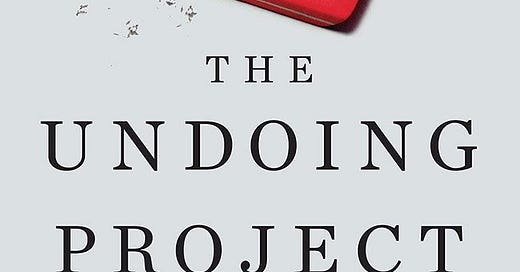I really like books that explore the hidden workings of the human mind. Over the years, my favorites include The Optimism Bias, The Power of Ritual, The Power of Habit, Think Again, Freakonomics, SuperFreakonomics, Think Like a Freak…you get the idea. Each explores the realms of psychology and behavioral economics, and—as such—each is forever indebted to the groundbreaking work of Amos Tversky and Daniel Kahneman.

You might not be a fan of “freaky” books, so Tversky and Kahneman probably aren’t household names. But don’t worry, you’re in very good company. At one point, Tversky and Kahneman were equally unknown to Michael Lewis, the author behind the wildly popular books Moneyball and The Big Short. But as Lewis developed those titles—each focusing on decision-making of significant financial consequence—he began to recognize the indelible influence of the two Israeli psychologists. In The Undoing Project, Lewis brilliantly explores the history leading up to their meeting, the warmth of their shared relationship and—most notably—the profound consequences of their collaboration. (Quick sidebar: I’m admittedly a bit behind on discovering this book, as it was originally published in 2017.)
Tversky and Kahneman are largely credited with amassing a body of work that helps explain how the human mind is sometimes hindered by implicit biases and “heuristics” (the general rules of thumb individuals adopt in situations of uncertainty whenever they are unable to calculate true statistical probability.) Findings from their collective work largely served to upend the prevailing economic theory of the time which assumed people always acted “rationally” when making decisions. Tversky and Kahneman were able to demonstrate convincingly—and repeatedly—that people aren’t always as rational as we might hope.
Since my public library had multiple copies (props to Poudre River!), I was able to hang on to the book for quite a while. So while I was reading, I used multi-colored sticky page flags to mark passages that were particularly notable or worth revisiting. By the time I was done, it looked like a large scarlet macaw got caught between the covers. Now that’s what I call an interesting read!

I do have one, minor gripe about this book. Here’s a quick excerpt of the book summary, taken verbatim from the jacket of The Undoing Project:
“Forty years ago, Israeli psychologists Daniel Kahneman and Amos Tversky wrote a series of breathtakingly original studies undoing our assumptions about the decision-making process. Their papers showed the ways in which the human mind erred, systematically, when forced to make judgements in uncertain situations.”
So imagine my surprise when—for the first full 50 pages of the book—Lewis dives headfirst into a protracted discussion about sports! He recaps his earlier writings about major league baseball, discusses common traits of college basketball prospects, and explores the world of NBA recruiters. For anyone uninterested in sports (and holy sweet Jesus do I hate them!) Lewis’s opening salvo feels like a classic bait-and-switch. But in discussing one recruiter who pioneered the use of statistical models in the NBA, Lewis writes:
“He never simply went with his first thought. He suggested a new definition of the nerd: a person who knows his own mind to mistrust it.” - Michael Lewis
So despite the seemingly incongruous subject matter, Chapter 1 is ultimately a perfect setup for what comes next. Ironically, you’ve got to first suffer through the sports to get to the main event.

So stick with it. By the time you get to chapter three, you’ll have totally forgotten about the sports. Or perhaps, better said: “recency bias” will mercifully come to your rescue.
Subscribe free-of-charge to receive post updates delivered directly to your inbox.
As you know, I don’t charge a dime for my priceless thoughts. But if you’re inclined to provide support, here are a few ways to do so:
If you liked this post share it with your friends with a kind word using the button below, or
connect with Noon at the Park on Twitter, Instagram and Facebook, or
Buy yourself something nice on Amazon. Here’s your monthly recommendation for September, but feel free to put whatever you want in your cart and hit “Buy Now”, or…
you can just send me a beer.
See? You don’t need to buy a subscription to the Washington Post to support quality journalism!




